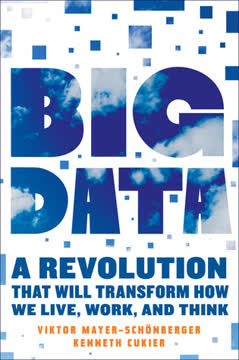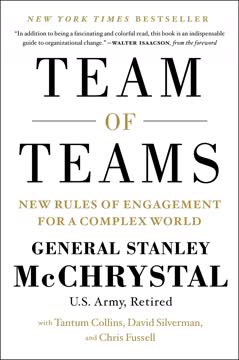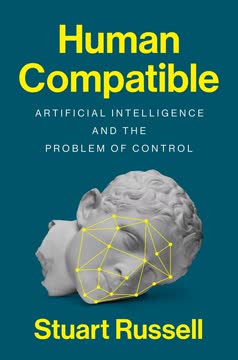Key Takeaways
1. The Internet Will Empower and Challenge Citizens Globally
The Internet is among the few things humans have built that they don't truly understand.
Global connectivity will reshape societies. As billions more people come online in the next decade, they will gain unprecedented access to information, opportunities, and each other. This will empower individuals, especially in developing countries, to improve their lives through education, economic opportunities, and participation in civic affairs. However, it will also introduce new challenges around privacy, security, and the potential for both liberation and oppression.
The digital divide will persist but evolve. While connectivity will spread widely, a "digital caste system" will endure:
- Wealthy elites: Largely insulated from negative effects
- Middle class: Primary drivers of innovation and change
- Newly connected billions: Greatest benefits but also greatest risks
Technology's impact will be transformative but complex. The Internet and mobile devices will:
- Enable economic growth and innovation
- Facilitate political organizing and activism
- Create new vulnerabilities to surveillance and cyber attacks
- Reshape social norms and cultural values
2. Virtual and Physical Identities Will Merge, Raising Privacy Concerns
We are what we tweet.
Online and offline identities will blur. As people conduct more of their lives online, their virtual identities will become as important as their physical ones. This convergence will have profound implications:
- Personal data will be more valuable and vulnerable
- Reputation management will be critical
- Privacy will be harder to maintain
The permanence of data will be a double-edged sword. Everything posted online will leave a permanent, searchable record:
- Positive: Accountability for bad behavior
- Negative: Youthful mistakes haunt people forever
- New industry: Reputation management services
Privacy will require constant vigilance. To protect privacy, individuals will need to:
- Carefully manage their online presence
- Use encryption and security tools
- Advocate for privacy protections
- Accept some loss of privacy as inevitable
3. States Will Adapt Their Policies for the Physical and Virtual Worlds
States will have to practice two foreign policies and two domestic policies—one for the virtual world and one for the physical world—and these policies may appear contradictory.
Governments will struggle to control cyberspace. The Internet's decentralized nature challenges state power, but governments will attempt to assert control through:
- Censorship and filtering
- Surveillance of citizens
- Cyber warfare capabilities
A "balkanization" of the Internet may occur. Some states may create national intranets or impose strict controls:
- China's Great Firewall
- Iran's "halal Internet"
- Russia's proposed "sovereign Internet"
Virtual and physical policies may diverge. States may:
- Allow more dissent online while cracking down physically
- Engage in cyber attacks against countries they wouldn't attack militarily
- Form new alliances based on shared approaches to Internet governance
4. The Future of Conflict Will Involve Both Cyber and Physical Warfare
Every state, from the least democratic to the most, may fight the growth of device-to-device communication.
Cyber warfare will become a key battlefield. States and non-state actors will increasingly use cyber attacks for:
- Espionage and intelligence gathering
- Disrupting critical infrastructure
- Economic warfare
Automated warfare will transform combat. The rise of drones, robots, and AI in warfare will:
- Reduce military casualties
- Enable more precise targeting
- Raise ethical questions about autonomous weapons
Information warfare will intensify. Conflicts will have a significant online component:
- Propaganda and disinformation campaigns
- Hacking and leaking sensitive information
- Mobilizing supporters through social media
New vulnerabilities will emerge. Critical systems will face threats from:
- State-sponsored hackers
- Terrorist groups
- Criminal organizations
5. Revolutions Will Start Faster but Face New Challenges to Succeed
Technology alone is no panacea for the world's ills, yet smart uses of technology can make a world of difference.
Technology will accelerate revolutionary movements. Social media and mobile devices will enable:
- Rapid organization of protests
- Wider dissemination of information
- Greater participation by citizens
Virtual activism may not translate to lasting change. Challenges include:
- "Slacktivism" replacing sustained engagement
- Difficulty transitioning from online to offline organizing
- Lack of experienced leadership in rapid movements
States will adapt to counter digital revolutions. Governments may:
- Use the same tools to monitor and suppress dissent
- Shut down internet access during unrest
- Spread misinformation to confuse and divide opponents
Successful movements will blend online and offline strategies. Keys to success:
- Building lasting organizational structures
- Developing experienced leadership
- Maintaining momentum beyond initial protests
6. Terrorism Will Evolve with Technology, Becoming More Sophisticated
What gives terror groups in the future an edge may not be their members' willingness to die for the cause; it might be how good their command of technology is.
Terrorists will exploit new technologies. Future threats may include:
- Drone attacks in urban areas
- Cyber attacks on critical infrastructure
- Sophisticated online recruitment and radicalization
Counterterrorism will face new challenges. Law enforcement and intelligence agencies will need to:
- Monitor vast amounts of online communications
- Defend against cyber attacks
- Counter extremist narratives online
Privacy and security trade-offs will intensify. Societies will debate:
- Extent of government surveillance powers
- Encryption and anonymity tools
- Balancing civil liberties with security needs
Technology may also aid in combating terrorism. Potential benefits include:
- Better threat detection through data analysis
- Improved coordination between agencies
- Tools to counter extremist propaganda online
7. Reconstruction Efforts Will Leverage Connectivity for Faster Recovery
Connectivity alone cannot revert a failed state, but it can drastically improve the situation for its citizens.
Communication networks will be a top priority. In post-conflict or disaster zones:
- Restoring mobile and internet access will be crucial
- Telecom companies may lead reconstruction efforts
- Satellite and mesh networks can provide temporary connectivity
Digital tools will aid recovery efforts. Technology can enable:
- Coordinating aid distribution
- Reuniting separated families
- Providing remote education and healthcare
- Facilitating economic recovery through mobile banking
Virtual institutions can maintain continuity. Cloud-based government services can:
- Preserve essential records and functions
- Enable remote operation if physical infrastructure is damaged
- Facilitate faster restoration of normal governance
Challenges will remain. Digital divides may persist:
- Not all citizens will have equal access to technology
- Digital skills training will be necessary
- Cyber security will be crucial to prevent exploitation
Last updated:
FAQ
What's The New Digital Age about?
- Digital Transformation: The book explores how digital technologies are reshaping the future of individuals, nations, and businesses, focusing on the Internet's impact on society, governance, and personal identity.
- Empowerment and Challenges: It highlights the empowerment connectivity brings while addressing privacy, security, and potential technology misuse, presenting the digital revolution as both an opportunity and a threat.
- Global Connectivity: The authors predict that by 2025, most of the world will be online, fundamentally changing interactions, business, and government engagement.
Why should I read The New Digital Age?
- Insightful Perspectives: Written by Eric Schmidt and Jared Cohen, the book offers unique insights from leaders in technology and foreign policy, providing a comprehensive view of the digital landscape.
- Understanding Future Implications: It helps readers grasp the implications of rapid technological advancements on society, governance, and personal freedoms, encouraging critical thinking about future-shaping choices.
- Engaging and Accessible: The authors present complex ideas in an engaging manner, making it suitable for both casual readers and experts interested in technology's societal impacts.
What are the key takeaways of The New Digital Age?
- Transformative Connectivity: Connectivity empowers individuals and communities, leading to significant social, cultural, and political changes, and acts as a tool for democratization and social justice.
- Privacy and Security Concerns: As more people come online, privacy and security issues become critical, requiring responsible navigation by individuals and governments.
- Technology in Governance: States will adapt to the digital age, with technology serving as both a tool for oppression and liberation, affecting governance and citizen engagement.
What are the best quotes from The New Digital Age and what do they mean?
- “The Internet is the largest experiment involving anarchy in history.”: Highlights the chaotic, unregulated nature of the Internet, where free expression coexists with misinformation and malicious actors.
- “The spread of connectivity will help reallocate the concentration of power away from states and institutions and transfer it to individuals.”: Reflects the belief that technology empowers citizens to hold governments accountable and participate actively in society.
- “What happens in the future is up to us.”: Emphasizes the responsibility of individuals and societies to shape technological outcomes, stressing ethical decision-making in the digital age.
How does The New Digital Age address the future of identity and citizenship?
- Multiple Online Identities: Individuals will have multiple identities in physical and virtual worlds, influencing real-world interactions and raising privacy concerns.
- Government Regulation: Governments may require online identity verification, potentially leading to a loss of anonymity and a more regulated Internet.
- Impact on Freedom: As online identities gain significance, individuals may face scrutiny and judgment, leading to self-censorship and fear of exposure.
What role does technology play in the future of states according to The New Digital Age?
- Gatekeeping Power: States will control Internet infrastructure, regulating access and content, shaping citizens' digital experiences.
- Balkanization of the Internet: Potential fragmentation into national networks, limiting information flow and creating isolated digital environments.
- Virtual Multilateralism: States may form alliances to regulate the Internet, leading to coordinated digital governance efforts among like-minded nations.
How does The New Digital Age predict the future of terrorism?
- Double-Edged Technology: Technology provides terrorists with new tools but also makes them vulnerable to detection and countermeasures.
- Cyber Terrorism: Rise of cyber terrorism, with extremist groups launching digital attacks on information systems and infrastructure.
- Increased Visibility: Terrorist actions will be more visible due to social media, leading to greater public scrutiny and government pressure.
What challenges does The New Digital Age identify for future revolutions?
- Sustainable Leadership: Successful revolutions require strong leadership, but many movements lack experienced leaders for post-revolution governance.
- Expectations Gap: Heightened public expectations post-revolution can lead to disillusionment if new leaders fail to deliver immediate results.
- Virtual and Physical Disconnect: Online activism must connect with real-world action to ensure revolutionary movements' sustained momentum and impact.
How does The New Digital Age suggest we can navigate privacy and security in the digital age?
- Shared Responsibility: Privacy and security are shared responsibilities among individuals, companies, and governments, requiring proactive protection steps.
- Technological Solutions: Strong encryption and security measures are crucial for safeguarding data, with companies prioritizing user privacy and transparency.
- Public Awareness: Education on privacy and security issues empowers individuals to understand online activities' implications and navigate the digital landscape effectively.
What is the significance of the "data revolution" discussed in The New Digital Age?
- Empowerment through Information: Unprecedented access to information empowers citizens to make informed decisions and hold governments accountable.
- Challenges of Data Permanence: Online data permanence raises privacy concerns and risks of personal information misuse.
- Impact on Governance: Governments must adapt to a more informed citizenry, requiring greater transparency and responsiveness.
How does The New Digital Age envision the future of global connectivity?
- Ubiquitous Access: By 2025, most of the world will be online, altering social, economic, and political dynamics and creating collaboration opportunities.
- Cultural Exchange: Increased connectivity facilitates cultural exchange and understanding, fostering global dialogue and cooperation.
- Challenges of Inequality: Connectivity won't eliminate inequalities; efforts are needed to ensure all individuals benefit from the digital age.
How does The New Digital Age address the future of governance?
- Virtual Institutions: Future governments may operate with virtual institutions, ensuring governance continuity even during crises.
- Citizen Engagement: Engaging citizens through technology fosters transparency and accountability, building trust and legitimacy.
- Data-Driven Decisions: Governments will rely on data analytics for policy decisions, enhancing efficiency and responsiveness to citizen needs.
Review Summary
The New Digital Age receives mixed reviews. Some praise its ambitious scope in analyzing technology's global impact, while others find it repetitive and lacking novel insights. Positive reviews highlight the book's geopolitical analysis and thought-provoking scenarios. Critics argue it's too focused on terrorism and fails to address corporate influence adequately. Many readers expected more discussion of future technologies and business implications. Overall, reviewers appreciate the authors' expertise but find the content less groundbreaking than anticipated, with some calling it overly optimistic about technology's potential.
Similar Books










Download PDF
Download EPUB
.epub digital book format is ideal for reading ebooks on phones, tablets, and e-readers.






